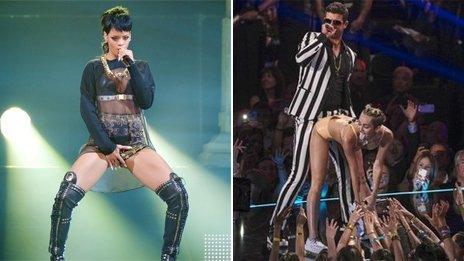Charlotte Church attacks 'sexist' music industry
- Published
- comments

Charlotte Church said "lurid" stars were having a bad influence on young fans
The music industry has a "culture of demeaning women" that forces stars to sell themselves as sex objects, according to singer Charlotte Church.
Church said she was "pressurised" into wearing revealing outfits in videos by male executives when she was 19 or 20.
Now 27, the star said young female artists were routinely "coerced into sexually demonstrative behaviour in order to hold on to their careers".
She made her comments during BBC 6 Music's annual John Peel Lecture.
Her stinging attack on sexism in the music industry comes amid a heated debate over the sexual imagery used by pop stars like Miley Cyrus and Rihanna.
Charlotte Church: A music industry with a juvenile perspective on gender and sexuality
The music business is "a male dominated industry with a juvenile perspective on gender and sexuality" and increasingly wants "sex objects that appear child-like", Church claimed.
The star accused record labels of encouraging young singers "to present themselves as hypersexualised, unrealistic, cartoonish, as objects, reducing female sexuality to a prize you can win".
She continued: "When I was 19 or 20 I found myself in this position, being pressurised into wearing more and more revealing outfits.
"The lines that I had spun at me again and again - generally by middle-aged men - were: 'You look great, you've got a great body, why not show it off?'
"Or: 'Don't worry, it will look classy, it will look artistic.' I felt deeply uncomfortable about the whole thing, but I was often reminded by record label executives just whose money was being spent."
She recalled feeling "massively uncomfortable" about dancing suggestively in little more than a basque and knee-high boots in the video for her single Call My Name in 2005.

Church said she had felt "massively uncomfortable" about being asked to wear revealing outfits
"Whilst I can't defer all blame away from myself, I was barely out of my teenage years and the consequence of this portrayal of me is that now I'm frequently abused on social media, being called slut, whore and a catalogue of other indignities," she said.
"Now I find it difficult to promote my music in the places it would be best suited because of my history."
She particularly criticised Miley Cyrus, Rihanna and Robin Thicke.
Cyrus's routine at the MTV Awards last month, in which she danced provocatively with Thicke and made suggestive gestures with a foam finger, sparked a furore over whether she had gone too far.
Sinead O'Connor wrote an open letter to the pop star, warning her not to be exploited by the music business.
Church also accused video websites of doing too little to prevent young viewers from being able to see explicit videos, and supported Annie Lennox's recent call to give pop videos film-style age ratings.
In her speech, delivered at the Radio Festival at The Lowry in Salford, Church added that radio stations should consider dropping singles by artists whose images were too risque.

Rihanna, Robin Thicke and Miley Cyrus have been criticised for risque routines
She said: "As Tony Hall, the BBC's director general, announces the new iPlayer channel for Radio 1, the question must be asked - should programmers take into consideration the image of an artist when deciding whether to play and promote their music?
"There are countless examples from the last few years of songs that have been in high rotation, that have little to no artistic worth, but are just plain rude."
BBC Radio 4's Woman's Hour broadcast a special live edition on Saturday, dedicated to women in music, to mark the lecture.
- Published7 October 2013
- Published4 October 2013
- Published3 October 2013
- Published27 August 2013